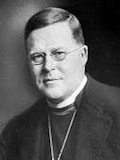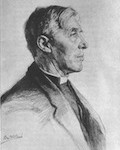Statements made by William Temple (1881-1944), the Archbishop of Canterbury, in support of rescuing Jewish refugees played a role in the debate in the United States over rescue policy.
In a series of public speeches, articles, and letters to the British press during 1942-1943, Temple expressed both his “burning indignation” at the Nazi mass murders and his strong disappointment at the response of the Allies. The Jews were “caught between the hammer of the enemy’s brutality and the anvil of democracy’s indifference,” he said. “In comparison with the monstrous evil confronting us the reasons for hesitation usually advanced by officials have an air of irrelevance.” The archbishop urged England and its allies to grant asylum “to any Jews who are able to escape the clutches of the Nazis.”
In an especially notable speech before the House of Lords in March 1943, Temple urged the Allies to take “immediate measures on the largest and most generous scale” to aid the Jews. The archbishop disputed the British government’s claim that public opinion would oppose taking in refugees; he insisted that “by skillful use of the wireless,” the government could effectively rally public support for helping those who “were being delivered to almost certain death.” The time had come to take action, he proclaimed: “We at this moment have upon us a tremendous responsibility. We stand at the bar of history, of humanity, and of God.”
British and American officials alike were concerned to see a prominent and influential religious leader at the head of a growing wave of public criticism over the Allies’ indifference to Hitler’s Jewish victims. In early 1943, British officials began formulating plans for an Allied conference on refugees. An internal Foreign Office memorandum explaining the need to respond to the “intense public interest” in the refugee problem singled out the Archbishop of Canterbury as one of those who had been “agitating the public conscience.”
The British government suggested holding the conference in Washington. But State Department official Breckinridge Long moved quickly to block that proposal, because–as he wrote in his diary–“to talk here would put us in a bad position with Canterbury giving publicity in the press and all the pressure which would be coming from the locally organized groups in this country.”
Ultimately the conference was held on the island of Bermuda. The failure of the attendees to craft concrete steps for rescue triggered widespread criticism, including a full-page newspaper advertisements by the Bergson Group’s Emergency Committee to Save the Jewish People of Europe under the headline, ” ‘We All Stand Before the Bar of History, Humanity, and God’,” citing Reverend Temple’s phrase.
Sources: Wyman, The Abandonment of the Jews, pp.48, 105, 108.










